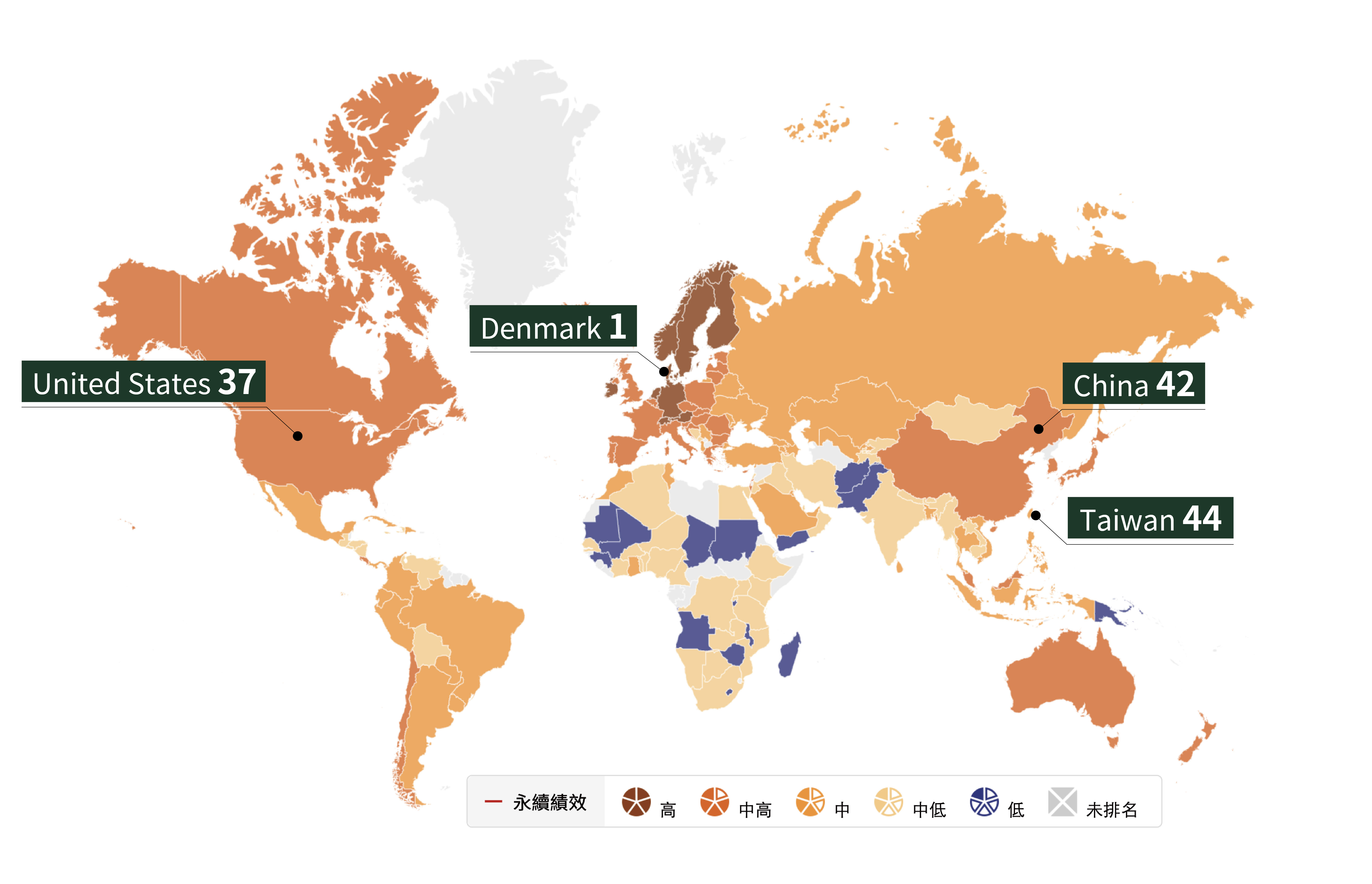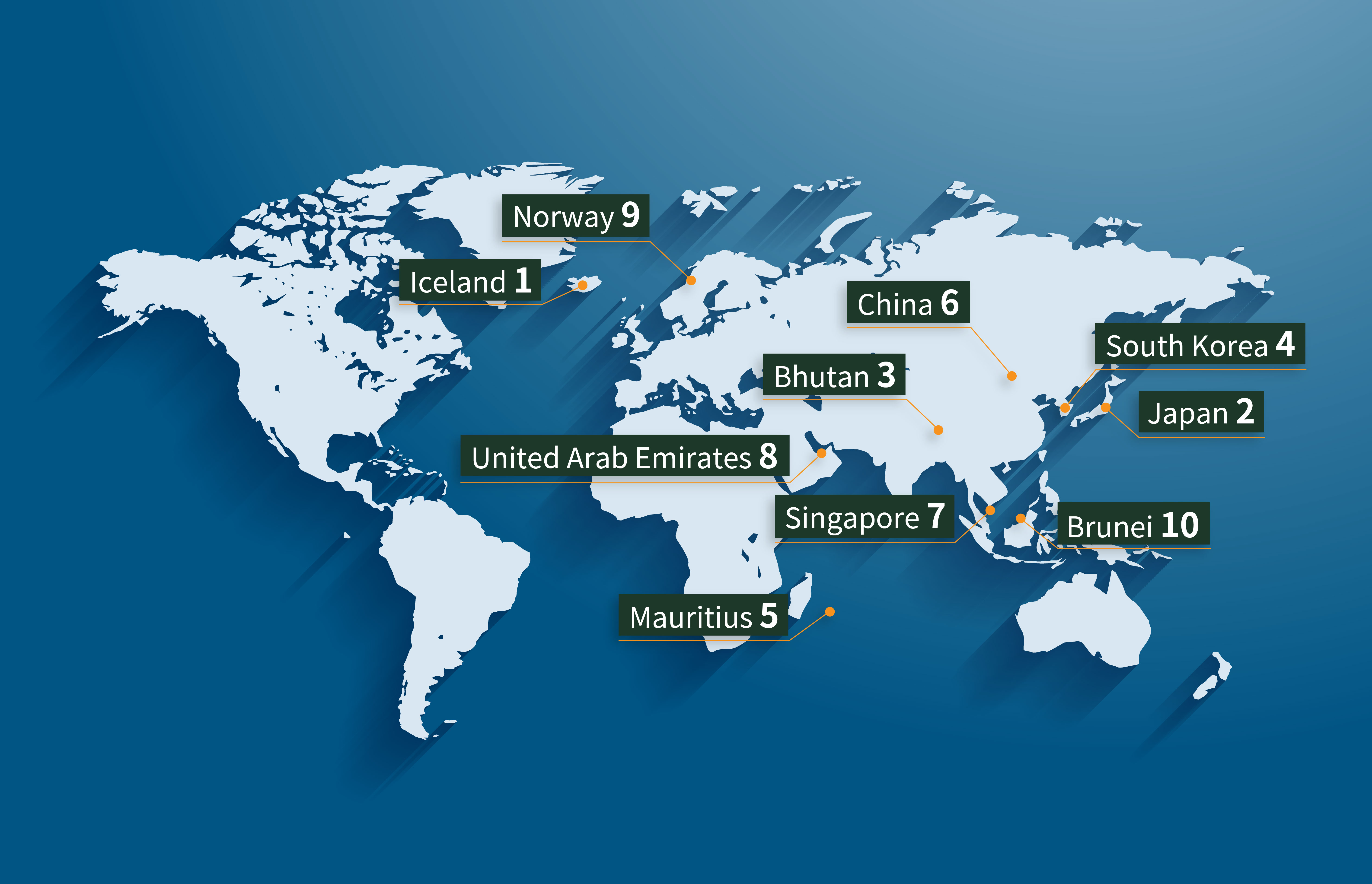Taiwan ranked 44th, Drops Five Places
Vietnam Benefits from China-US Trade War, Leaps in Ranking
The Foundation of Chinese Culture for Sustainable Development's Wang Dao Sustainability Index (WDSI) has now become an annual ranking since the release of its 2020 findings. The top five nations announced this year for the new 2021 rankings are Denmark, Sweden, Norway, Switzerland and Finland, results similar to the 2018 and 2020 WDSI rankings.
Since its inception in 2018, the WDSI has utilized 65 indicators spanning three domains―Global Ethics, Inclusive Development, and Environmental Equilibrium―to evaluate the sustainable development performance of countries and economies. The subjects of evaluation have grown from 97 countries and economies in 2020 to 145 this year, including 35 developed economies and 109 emerging economies (for Hong Kong, only indicators in the two domains of Inclusive Development and Environmental Equilibrium were released).
Overall, the 2021 WDSI rankings were little changed from those of the previous two years. The Nordic countries remain at the top, and European nations have demonstrated positive growth. With the exception of Vietnam's rise in ranking, other Asian countries mostly showed ranking stability or slight decline; while African nations comprised the majority of the lower ranks, as all were emerging economies that have yet to enter the stage of rapid growth.
The United States benefited from economic and trade measures in the early stages of the China-US trade war that stimulated economic growth and rose by 6 ranks to 37th place; while the People's Republic of China slipped one rank to 42nd place. Overall, Taiwan declined five spots, dropping to 44th rank, placing it last among developed economies. This was due to its sub-optimal performance among indicators of the Inclusive Development domain such as stability of electricity supply and the international assessment of declining personal freedoms, as well as slight increases in the consumption of energy and natural resources among indicators in the domain of Environmental Equilibrium. This is worthy of vigilance. Poland (ranked 11th) continued to place top among emerging economies; while Vietnam benefited from the China-US trade war, and rose sharply in ranking to 56, making it the largest gainer in 2021. The countries declining in rank the most during the year were Cuba (80th) and Panama (78th).

2021 WDSI Ranking Map
Cultural Factors Affect Pandemic Development
Over the past three years, WDSI has attempted to view major global social and economic issues from a Wang Dao cultural perspective. In 2020, when the global pandemic was severe and vaccines had yet to appear, WDSI found that the influence of cultural factors on the development of the pandemic was not be underestimated. At the time, the Covid-19 case mortality rate in countries and regions throughout the Judeo-Christian cultural sphere was 58 times that of countries in the Confucian cultural sphere. With the introduction of vaccines in 2021, the political and economic strength of each country became an important factor, and their respective actions to counter the pandemic gradually overshadowed cultural factors. However, with the appearance of the Omicron variant strain at the end of 2021, fears of significantly diminished effectiveness of the existing vaccine-induced antibodies dragged the campaign to counter the pandemic into a new wave of intense policy confrontation, and cultural factors once again exerted influence.
To this end, in 2021, based on the principles of Benevolent Governance, People-orientedness, Counter-hegemony and Empathy, the WDSI utilized data spanning the year 2020 to the end of September 2021 to devise five indicators―Secured Vaccine Rate, Fully Vaccinated Rate, Vaccine Donation, Total Fatality Rate, and Case Fatality Rate―as evaluation criteria for ranking 173 countries and economies around the world in order to produce the 2021 COVID-19 Pandemic Response Rankings. It discovered that most of the top 20 were Asian countries, including 7 of the top 10, of which four belong to the East Asian Confucian cultural sphere. Clearly, cultural factors played an important role in the management of the pandemic. Looking back over the past year, although Taiwan has for most of the time been in a state of pandemic remission, its Secured Vaccine Rate and Fully Vaccinated Rate have been insufficient, and it ranks among the top 5 globally for COVID-19 Case Fatality (likely connected to the small number of people tested), resulting in Taiwan being ranked 83rd due to its sub-optimal performance compared to other countries in the Confucian cultural sphere.

2021 COVID-19 Pandemic Response Rankings

2021 COVID-19 Pandemic Response Rankings Map
Three Noteworthy Major Trends
In addition to unremitting mutation of the COVID-19 virus causing the world to repeatedly relapse into the throes of the pandemic, looking to the future challenges of the global pursuit of sustainability, the 2021 WDSI specially offered analysis of three major trends:
Pandemic: The black-swan effect of COVID-19 continued to ferment, the efficacy of the vaccines was repeatedly pierced by breakthrough infection, and cultural factors are again exerting an effect.
Armaments: The confrontation between the United States and China has brought on a global arms race, leading to the gradual rise of medium-sized powers in the geopolitical region. It has also forced many small countries squeezed between different powers to bolster their armaments for self-protection, hence the global arms race has quietly heated up.
Carbon neutrality: With the end of the United Nations Climate Conference (COP26) in 2021, an important watershed in human history was demarcated for the sustainability goal of seeking carbon reduction. The three major carbon emitting countries―the United States, China and India―committed to different deadlines for attaining carbon neutrality. Carbon tax regulations are under active discussion. Although there are still huge disagreements between North and South countries, this trend is bound to comprehensively affect the global energy structure, economies and industries, and subsequent social and economic phenomena such as inflation and the widening gap between rich and poor. Given that Taiwan is almost totally reliant on energy imports, it ought to take action soon regarding how to respond to the situation.
Tracing back to its roots, the inspiration for the WDSI project stemmed from the Foundation of Chinese Culture for Sustainable Development observing the inordinate global pursuit of economic growth, and the continuous demonstration of hegemony by the world's major powers toward the outside world. Concluding that the ever increasing problems resulting thereof cannot be solved by reliance on Western civilization alone, it assembled a team of experts and scholars dedicated to developing the Wang Dao Sustainability Index based on the core concepts of the ancient Confucian spirit of benevolent, empathetic, sustainable and people-oriented rule known in Chinese as Wang Dao. The results show that the correlation coefficient between WDSI and the United Nations Sustainable Development Index is as high as 0.92. This demonstrates the universal and universally applicable value of the WDSI, and offers an alternative reference coordinate with a Chinese cultural heritage background for the sustainable development policymaking of various countries.